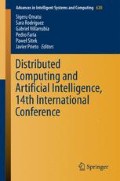Abstract
Teacher evaluation is considered an important process in higher education institutions to know about teacher performance and implement constructive strategies in order to benefit students in their education. The opinion of students has become one of the main factors to consider when evaluating teachers. In this study we present a Model called SocialMining using a corpus of real comments in Spanish about teacher performance assessment. We applied Support Vector Machines algorithm with three kernels: linear, radial and polynomial, to predict a classification of comments in positive, negative or neutral. We calculated sensibility, specificity and predictive values as evaluation measures. The results of this work may help other experiments to improve the classification process of comments and suggest teacher improvement courses for teachers.
Access this chapter
Tax calculation will be finalised at checkout
Purchases are for personal use only
Preview
Unable to display preview. Download preview PDF.
References
1. Bing, L., Sentiment Analysis and Opinion Mining (Synthesis Lectures on Human Language Technologies). Morgan & Claypool Publishers., 2012.
2. Binali, H.H., Chen Wu, and Vidyasagar Potdar., A new significant area: Emotion detection in E-learning using opinion mining techniques. Digital Ecosystems and Technologies, 2009. DEST’09. 3rd IEEE International Conference on. IEEE, 2009.
3. Wen, M., Yang, D., & Penstein Rosé, C., Sentiment Analysis in MOOC Discussion Forums: What does it tell us? . Proceedings of Educational Data Mining, 1 - 8. (http://goo.gl/fViyBH), 2014.
4. Altrabsheh, N., Cocea, M., & Fallahkhair, S., Learning Sentiment from Students’ Feedback for Real-Time Interventions in Classrooms. Adaptive and Intelligent Systems. Volume 8779 of the series Lecture Notes in Computer Science, 40-49. doi: http://dx.doi.org/10.1007/978-3-319-11298-5_5, 2014.
5. Ortigosa, A., Martín, J. & Carro, R., Sentiment analysis in Facebook and its application to e-learning. Computers in Human Behavior. Volume 31, 527 - 541, http://dx.doi.org/10.1016/j.chb.2013.05.024, 2014.
6. Pong-inwong, C.R., W., TeachingSenti-Lexicon for Automated Sentiment Polarity Definition in Teaching Evaluation. In Semantics, Knowledge and Grids (SKG), 10th International Conference, 84–91, Beijing: IEEE., 2014.
7. Kaewyong, P., Sukprasert, A., Salim, N., and Phang, A., The possibility of students’ comments automatic interpret using lexicon based sentiment analysis to teacher evaluation. Conference: The 3rd International Conference on Artificial Intelligence and Computer Science 2015, At Penang,MALAYSIA, 2015.
8. F., C., M., de Santo and L., Greco, SAFE: A Sentiment Analysis Framework for E-Learning. International Journal of Emerging Technologies in Learning, Vol. 9, Issue 6, pp. 37, 2014.
9. Pang, B., & Lee, L., Thumbs up? Sentiment Classification using Machine Learning Techniques. EMNLP ‘02 Proceedings of the ACL-02 conference on Empirical methods in natural language processing - Volume 10. Pages 79-86. doi>10.3115/1118693.1118704, 2002.
10. Bharathisindhu, P., & Brunda, S., Identifying e-learner’s opinion using automated sentiment analysis in e-learning. IJRET: International Journal of Research in Engineering and Technology. Volume: 03 Issue: 01. doi: http://dx.doi.org/10.15623/ijret.2014.0319086, 2014.
11. Kirubakaran, A.J.a.E., M-Learning Sentiment Analysis with Data Mining Techiniques. International Journal of Computer Science and Telecommunications. Trichy-India., 2012.
12. I.H. Witten, E.F., and M. A. Hall., Data Mining: Practical Machine Learning Tools and Techniques. Morgan Kaufmann, third edition., 2011.
13. J. Han, M.K., and J. Pei, Data Mining: concepts and techniques. Morgan Kaufmann, San Francisco, USA., 2012.
14. Vapnick, V., Statistical Learning Theory. Wiley, New York, 1998.
15. Esuli, A.S., F., SENTIWORDNET: a publicly available lexical resource for opinion mining. . In Proceedings of the 5th Conference on Languaje Resources and Evaluation (LREC 2006). pages 417-422, Genoa, Italy., 2006.
16. C.C. Hsu, C.W.C.a.C.J.L., A practical guide to support vector classification. Technical report, Department of Computer Science, National Taiwan University, 2003.
17. R-Core-Team, R: A language and environment for statistical computing. R Foundation for Statistical Computing, Vienna, Austria. (http://goo.gl/e40yiU), 2013.
18. Hothorn, T., Leisch, F., Hornik, K. and Zeileis A., The design and analysis of benchmark experiments. Journal of Computational and Graphical Statistics. Vol 14 (3) pp. 675-699., 2005.
19. Gutiérrez, G., Padilla, A., Canul-Reich, J., De-Luna, A. and Ponce, J., Proposal of a Sentiment Analysis Model in Tweets for Improvement of the Teaching - Learning Process in the Classroom Using a Corpus of Subjectivity. International Journal of Combinatorial Optimization Problems and Informatics, Vol. 7, No. 2, May-Aug 2016, pp. 22-34., 2016.
Author information
Authors and Affiliations
Corresponding author
Editor information
Editors and Affiliations
Rights and permissions
Copyright information
© 2018 Springer International Publishing AG
About this paper
Cite this paper
Esparza, G.G. et al. (2018). A Sentiment Analysis Model to Analyze Students Reviews of Teacher Performance Using Support Vector Machines. In: Omatu, S., Rodríguez, S., Villarrubia, G., Faria, P., Sitek, P., Prieto, J. (eds) Distributed Computing and Artificial Intelligence, 14th International Conference. DCAI 2017. Advances in Intelligent Systems and Computing, vol 620. Springer, Cham. https://doi.org/10.1007/978-3-319-62410-5_19
Download citation
DOI: https://doi.org/10.1007/978-3-319-62410-5_19
Published:
Publisher Name: Springer, Cham
Print ISBN: 978-3-319-62409-9
Online ISBN: 978-3-319-62410-5
eBook Packages: EngineeringEngineering (R0)

